专升本英语语法
英语专升本语法基础知识大全
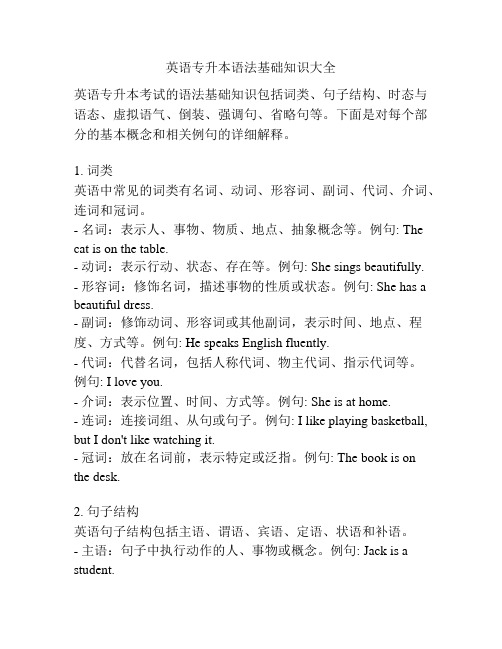
英语专升本语法基础知识大全英语专升本考试的语法基础知识包括词类、句子结构、时态与语态、虚拟语气、倒装、强调句、省略句等。
下面是对每个部分的基本概念和相关例句的详细解释。
1. 词类英语中常见的词类有名词、动词、形容词、副词、代词、介词、连词和冠词。
- 名词:表示人、事物、物质、地点、抽象概念等。
例句: The cat is on the table.- 动词:表示行动、状态、存在等。
例句: She sings beautifully. - 形容词:修饰名词,描述事物的性质或状态。
例句: She has a beautiful dress.- 副词:修饰动词、形容词或其他副词,表示时间、地点、程度、方式等。
例句: He speaks English fluently.- 代词:代替名词,包括人称代词、物主代词、指示代词等。
例句: I love you.- 介词:表示位置、时间、方式等。
例句: She is at home.- 连词:连接词组、从句或句子。
例句: I like playing basketball, but I don't like watching it.- 冠词:放在名词前,表示特定或泛指。
例句: The book is on the desk.2. 句子结构英语句子结构包括主语、谓语、宾语、定语、状语和补语。
- 主语:句子中执行动作的人、事物或概念。
例句: Jack is a student.- 谓语:句子中说明主语动作或状态的部分。
例句: The cat is sleeping.- 宾语:接受动作的对象。
例句: She bought a book.- 定语:修饰名词或代词的词组或从句。
例句: I like the blue car.- 状语:修饰动词、形容词或副词的词组或从句。
例句: He waited patiently.- 补语:用来补充说明主语或宾语的信息。
例句: She is a teacher.3. 时态与语态- 时态:表示动作或状态发生的时间。
专升本英语语法重点汇总
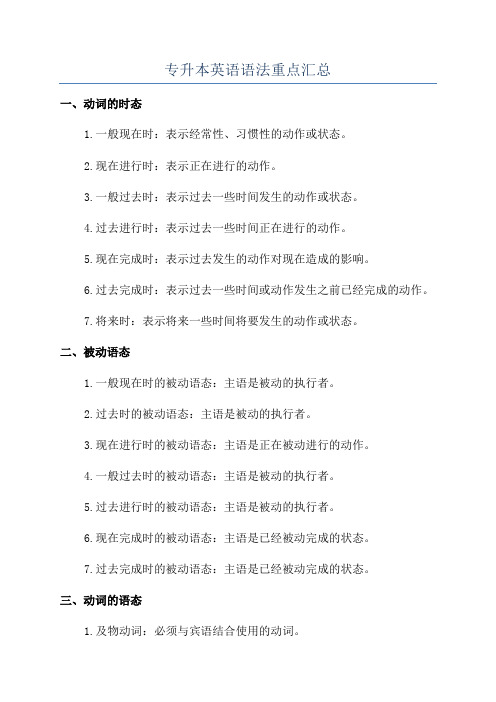
专升本英语语法重点汇总一、动词的时态1.一般现在时:表示经常性、习惯性的动作或状态。
2.现在进行时:表示正在进行的动作。
3.一般过去时:表示过去一些时间发生的动作或状态。
4.过去进行时:表示过去一些时间正在进行的动作。
5.现在完成时:表示过去发生的动作对现在造成的影响。
6.过去完成时:表示过去一些时间或动作发生之前已经完成的动作。
7.将来时:表示将来一些时间将要发生的动作或状态。
二、被动语态1.一般现在时的被动语态:主语是被动的执行者。
2.过去时的被动语态:主语是被动的执行者。
3.现在进行时的被动语态:主语是正在被动进行的动作。
4.一般过去时的被动语态:主语是被动的执行者。
5.过去进行时的被动语态:主语是被动的执行者。
6.现在完成时的被动语态:主语是已经被动完成的状态。
7.过去完成时的被动语态:主语是已经被动完成的状态。
三、动词的语态1.及物动词:必须与宾语结合使用的动词。
2.不及物动词:不需要与宾语结合使用的动词。
四、倒装句1.完全倒装:把助动词或情态动词放在主语前。
2.部分倒装:把助动词或情态动词放在谓语动词前。
五、情态动词1. can:表示能力、许可、可能。
2. could:表示过去的能力、许可、可能。
3. may:表示允许、可能。
4. might:表示过去可能。
5. must:表示推测、必须。
6. shall:表示将来的意愿。
7. should:表示建议、应该。
8. will:表示将来。
9. would:表示过去习惯、愿意。
六、名词1.可数名词:可以用来计数的名词。
2.不可数名词:不可以用来计数的名词。
3.特殊名词变复数形式。
4.特殊名词变单数形式。
七、形容词和副词1.形容词在句中的位置。
2.形容词比较级和最高级。
3.副词在句中的位置。
4.副词比较级和最高级。
五、代词1.主格代词:作为主语的代词。
2.宾格代词:作为宾语的代词。
3.物主代词:表示所属关系的代词。
4.反身代词:表示动作反过来作用于自己的代词。
专升本英语语法讲义
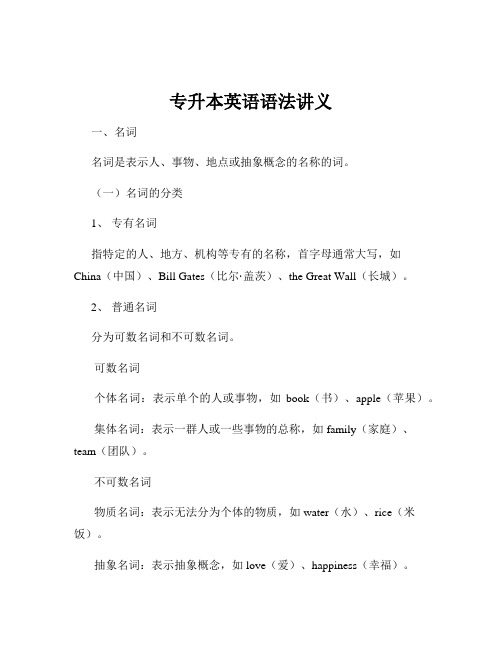
专升本英语语法讲义一、名词名词是表示人、事物、地点或抽象概念的名称的词。
(一)名词的分类1、专有名词指特定的人、地方、机构等专有的名称,首字母通常大写,如China(中国)、Bill Gates(比尔·盖茨)、the Great Wall(长城)。
2、普通名词分为可数名词和不可数名词。
可数名词个体名词:表示单个的人或事物,如book(书)、apple(苹果)。
集体名词:表示一群人或一些事物的总称,如 family(家庭)、team(团队)。
不可数名词物质名词:表示无法分为个体的物质,如 water(水)、rice(米饭)。
抽象名词:表示抽象概念,如 love(爱)、happiness(幸福)。
(二)名词的数1、可数名词的复数形式一般在名词后加 s,如 books,apples。
以 s,x,ch,sh 结尾的名词,加 es,如 buses,boxes,watches,dishes。
以辅音字母+ y 结尾的名词,把 y 变为 i 再加 es,如 city cities,baby babies。
但以元音字母+ y 结尾的名词,直接加 s,如 boy boys,day days。
以 f 或 fe 结尾的名词,把 f 或 fe 变为 v 再加 es,如 knife knives,leaf leaves。
但有些词直接加 s,如 roof roofs,chief chiefs。
不规则变化,如 man men,woman women,child children,foot feet,tooth teeth 等。
2、不可数名词的量化不可数名词要表示数量,需要用量词短语,如 a piece of paper(一张纸),a cup of coffee(一杯咖啡),two bottles of water(两瓶水)。
(三)名词的所有格1、表示有生命的名词的所有格一般在名词后加's,如 Tom's book(汤姆的书)。
专升本英语语法精品讲义ppt课件

9.It was a meeting________importance I did not realize at the time. A.which B.at which C.its D.whose 解析:定语从句修饰meeting,引导词whose在定语从句中
语法专练
1.I have seen the film,________leading actor is my
favourite. A.its B.that C.whose D.which 解析:定语从句修饰film,引导词在定语从句中作 leading actor的定语,表所属关系。 答案:C 2.The girl________everybody had thought could win a gold
的关系,whom作of的宾语。 答案:C
定语从句(二) 1.whom,which在定语从句中可作介词的宾语,这样的介词一
般放在whom,which之前也可放在原来的位置上。that也可作 介词宾语,但介词不能放在that前,只能放在原位置上;含有 介词的固定词组,介词也只能放在原位置上。 This is the nurse to whom Tom spoke just now.=This is the nurse whom Tom spoke to just now. 这就是那个Tom刚才跟她谈话的护士。 The child whom you take care of is ill.你照看的那小孩病了。
码”。后面是倒装句。 答案:C
7.I don’t like the way________he spoke to me. A.what B.by which C.by that D./ 解析:定语从句修饰way,引导词作状语时可用in which/that/不填。 答案:D
英语知识点归纳专升本

英语知识点归纳专升本一、语法知识点1. 时态- 现在时态(Simple Present Tense)表示现阶段普遍的真实情况或习惯动作。
- 过去时态(Simple Past Tense)表示过去已经发生的事实或状态。
- 将来时态(Simple Future Tense)表示将要发生的动作或存在的状态。
2. 语态变化- 主动语态(Active Voice)表示主语是动作的执行者。
- 被动语态(Passive Voice)表示主语是动作的承受者。
3. 名词名词是指人、事物、地点等名字的词语。
在句子中可以作为主语、宾语、表语、定语等成分。
4. 代词代词用来替代名词,可以分为人称代词、物主代词、指示代词、反身代词等。
5. 形容词形容词用来修饰名词或代词,描述特征、性质、状态等。
6. 副词副词用来修饰动词、形容词、其他副词,表示方式、时间、地点、程度等。
7. 动词动词是指做或表示动作或状态的词语,可以分为及物动词和不及物动词。
8. 介词介词用来连接名词或代词与其他词语,表示关系、位置、方向等。
9. 连词连词用来连接句子、短语或词语,可以分为并列连词、从属连词和并列从属连词。
10. 冠词冠词用来限定名词,在英语中包括不定冠词"a/an"和定冠词"the"。
11. 数量词数量词用来表示数目或数量的词语,可以分为基数词和序数词。
12. 比较级和最高级比较级和最高级用于形容词和副词,用来比较两个或多个人或事物之间的差异。
13. 疑问词疑问词用来引导疑问句,包括who, what, where, when, why, how等。
14. 从句从句是包含一个主语和一个谓语的句子,可以作为主句或从句使用。
二、词汇知识点1. 同义词同义词是指意思相同或相近的词语,比如happy和glad。
2. 反义词反义词是指意思相反的词语,比如good和bad。
3. 多义词多义词是指有多个意思的词语,比如bank可以表示银行或岸边。
专升本英语语法知识归纳(完整版)
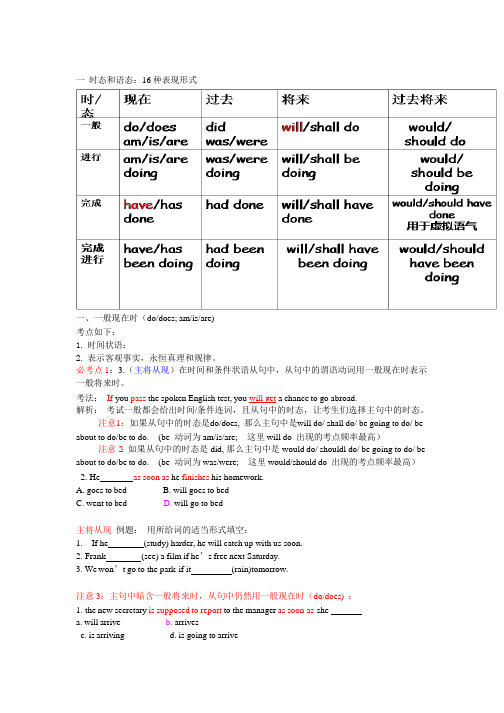
1. we
the Journey to the West since we were young.
a. saw
b. have see
c. have seen
d. have been seen
2. hurry up! the film
for ten minutes.
a. had begun
b. has begun
B. would have repaired
C.have repaired
D. had repaired
4.He
just
(finish) his homework.
六:过去完成时(had done)与将来完成时(will have done)
必考点总结:
(1) 过去完成时:by /by the end of + 过去时间(by last week/month/year)
将来完成时:by /by the end of+将来时间 (by next/this week/month/year)
to me.
a. write b. will write
c. are writing d. would write
4. If Mr. Smith
back, please let me know.
A. will come B. comes C. came D. had come
必考点 2:4. the more..., the more...句型 完整句型:The +形容词/副词的比较级+(名词)+主语+谓语,the +形容词/副词的比较级+ (名词)+主语+谓语.
英语专升本语法知识点汇总

英语专升本语法知识点汇总一、时态。
1. 一般现在时。
- 用法:- 表示经常或习惯性的动作或存在的状态。
例如:I go to school by bike every day.(我每天骑自行车去上学。
)- 表示客观事实或普遍真理。
例如:The earth moves around the sun.(地球绕着太阳转。
)- 结构:- 主语为第三人称单数(he/she/it等)时,动词要加 -s或 -es,如He likes reading. 其他人称用动词原形,如I like reading.2. 一般过去时。
- 用法:- 表示过去某个时间发生的动作或存在的状态。
例如:I visited my grandparents last weekend.(我上周末去看望了我的祖父母。
)- 结构:- 动词一般用过去式形式。
规则动词的过去式一般在词尾加 -ed,如work - worked;不规则动词有其特殊的过去式形式,如go - went。
3. 一般将来时。
- 用法:- 表示将来某个时间要发生的动作或存在的状态。
例如:I will go to Beijing next month.(我下个月将去北京。
)- 结构:- 常见的结构有will+动词原形,be going to+动词原形(表示计划、打算做某事或有迹象表明即将发生某事)。
如He is going to have a party tonight.(他今晚打算举办一个聚会。
)4. 现在进行时。
- 用法:- 表示现在正在进行的动作或存在的状态。
例如:She is reading a book now.(她现在正在读一本书。
)- 结构:- be动词(am/is/are)+动词的 -ing形式。
5. 过去进行时。
- 用法:- 表示过去某个时刻或某段时间正在进行的动作。
例如:I was watching TV at 8 o'clock last night.(昨晚8点我正在看电视。
专升本英语语法重点汇总

专升本英语语法重点汇总1.主谓一致- 单数主语与单数谓语动词搭配,如"The cat is sleeping."- 复数主语与复数谓语动词搭配,如"The cats are sleeping."- 不定代词"everyone, everybody, someone, somebody"的主语与谓语动词搭配时,使用第三人称单数形式,如"Everybody loves ice cream."2.时态- 现在进行时:表示目前正在发生的动作或临时的动作,一般由“be + 现在分词”构成,如"She is reading a book."- 现在完成时:表示过去发生的一种持续的动作或状态,与现在的影响或结果有关,一般由“have/has + 过去分词”构成,如"They have finished their homework."- 过去进行时:表示过去其中一具体时间正在进行的动作,一般由“was/were + 现在分词”构成,如"We were playing basketball yesterday."- 过去完成时:表示在过去其中一时间或动作之前已经完成的动作,一般由“had + 过去分词”构成,如"She had already eaten when I arrived."3.强调句- 强调句是为了将强调句子中的一些成分突出表达,一般由“Itis/was + 被强调部分 + that/who + 原句其余部分”构成,如"It was John who told me the good news."- 当强调句的被强调部分是动词时,需使用“do/does/did”来构成强调句,如"It was he who did all the work."4.虚拟语气- 与现在事实相反的虚拟语气,使用"would, could, might"等情态动词与原型动词搭配,如"If I were you, I would go to the party."- 与过去事实相反的虚拟语气,使用"had + 过去分词"构成,如"IfI had known, I would have helped him."5.定语从句- 定语从句用来修饰先行词,修饰的内容可以是人、事物或整个句子,一般由关系代词"who, whom, whose, which, that"或关系副词"where, when, why"引导,如"The book that I bought is very interesting."6.名词性从句- 主语从句:作为句子的主语,一般由"that, whether, who, whom, which"引导- 宾语从句:作为句子的宾语,一般由"that, whether, if, what, who, whom, which"引导,如"I don't know what to do."- 表语从句:位于系动词之后,与主语构成等价关系,一般由"that, whether, who, whom, which"引导,如"The important thing is that you try your best."7.比较级和最高级- 比较级用来比较两个人或物之间的差异,一般在形容词或副词前加"more"或"less"构成,如"She is taller than her sister."- 最高级用来表示三个或三个以上人或物之间的差异,一般在形容词或副词前加"the most"或"the least"构成,如"He is the tallest boy in the class."以上是专升本英语语法的重点汇总,希望对你的学习有所帮助。
专升本英语语法知识点精讲
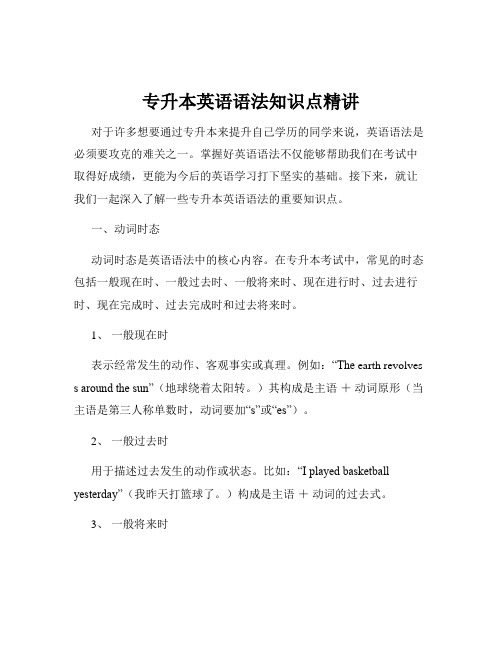
专升本英语语法知识点精讲对于许多想要通过专升本来提升自己学历的同学来说,英语语法是必须要攻克的难关之一。
掌握好英语语法不仅能够帮助我们在考试中取得好成绩,更能为今后的英语学习打下坚实的基础。
接下来,就让我们一起深入了解一些专升本英语语法的重要知识点。
一、动词时态动词时态是英语语法中的核心内容。
在专升本考试中,常见的时态包括一般现在时、一般过去时、一般将来时、现在进行时、过去进行时、现在完成时、过去完成时和过去将来时。
1、一般现在时表示经常发生的动作、客观事实或真理。
例如:“The earth revolves s around the sun”(地球绕着太阳转。
)其构成是主语+动词原形(当主语是第三人称单数时,动词要加“s”或“es”)。
2、一般过去时用于描述过去发生的动作或状态。
比如:“I played basketball yesterday”(我昨天打篮球了。
)构成是主语+动词的过去式。
3、一般将来时表示将来要发生的动作,常见的表达有“will +动词原形”和“be going to +动词原形”。
例如:“I will go to Beijing next week” (我下周要去北京。
)4、现在进行时表示正在进行的动作,结构为“be +现在分词”。
如:“She is reading a book now”(她现在正在读书。
)5、过去进行时强调过去某个时刻正在进行的动作,“was/were +现在分词”是其构成形式。
像:“I was watching TV at 8 o'clock last night” (昨晚八点我正在看电视。
)6、现在完成时表示过去发生的动作对现在造成的影响或结果,或者从过去开始一直持续到现在的动作。
“have/has +过去分词”为其结构。
例如:“I have learned English for five years”(我学英语已经五年了。
)7、过去完成时在过去某个时间点之前已经完成的动作,由“had +过去分词”构成。
专升本语法知识点总结

专升本语法知识点总结一、名词1.名词的基本概念名词是指人、事物、地点、动作或抽象概念的名称,是一类词性的词汇。
名词包括专有名词和普通名词,专有名词是特指某个人或某个物体的名称,如中国、李华;普通名词是泛指某种人或某种物体,如桌子、鸟类。
2.名词的种类名词分为专有名词和普通名词,普通名词又可分为可数名词和不可数名词。
可数名词指的是可以数清数量的名词,如书、苹果;不可数名词指的是不能数清数量的名词,如水、米。
3.名词的单数和复数形式名词的单数形式和复数形式的判断原则是需要根据名词词尾的变化来决定,如直接加-s,如books、apples;以s,x,sh,ch结尾的名词,复数形式加-es,如boxes、dresses。
4.名词的所有格名词所有格是名词与其所有者之间的关系,一般在名词后面加's来表示名词所有格,如Tom's book,表示汤姆的书。
二、代词1.代词的基本概念代词是用来代替名词或名词短语的词语,用以避免重复,指示特定对象或人。
代词分为人称代词、物主代词、反身代词、指示代词、疑问代词和不定代词等。
2.代词的种类人称代词包括主格和宾格,主格用于作主语,宾格用于作宾语、介词宾语和表语。
物主代词用于表示所属关系。
反身代词是指表示动作的主语和宾语是同一个人或事物的代词,如myself、herself。
指示代词用于指示特定对象或人,如this、that、these、those。
疑问代词用于提问,如what、which、who、whom、whose。
不定代词是指不具体指代任何人或物的代词,如some、any、each。
3.代词的主要用法代词主要用于句子中的不同位置,如作主语、宾语、表语、补语、介词宾语等。
三、动词1.动词的基本概念动词是指表示动作、状态或行为的词语,是句子的谓语部分,用于表示人或事物的动作或状态。
动词分为不及物动词和及物动词,不及物动词是指没有直接宾语的动词,如run、swim;及物动词是指需要直接宾语的动词,如eat、drink。
专升本英语语法十五要点
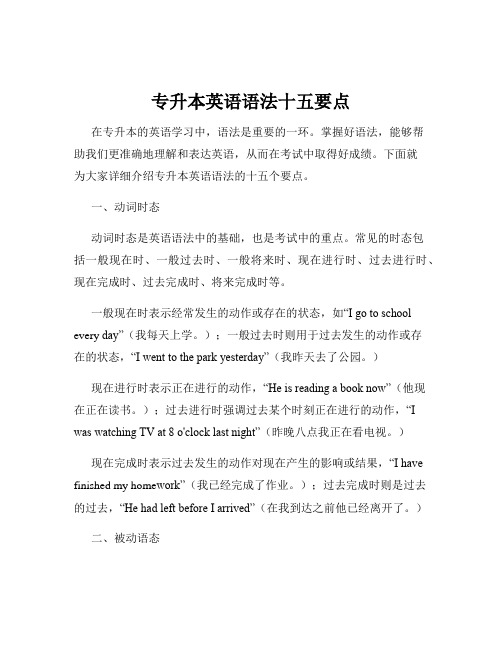
专升本英语语法十五要点在专升本的英语学习中,语法是重要的一环。
掌握好语法,能够帮助我们更准确地理解和表达英语,从而在考试中取得好成绩。
下面就为大家详细介绍专升本英语语法的十五个要点。
一、动词时态动词时态是英语语法中的基础,也是考试中的重点。
常见的时态包括一般现在时、一般过去时、一般将来时、现在进行时、过去进行时、现在完成时、过去完成时、将来完成时等。
一般现在时表示经常发生的动作或存在的状态,如“I go to school every day”(我每天上学。
);一般过去时则用于过去发生的动作或存在的状态,“I went to the park yesterday”(我昨天去了公园。
)现在进行时表示正在进行的动作,“He is reading a book now”(他现在正在读书。
);过去进行时强调过去某个时刻正在进行的动作,“I was watching TV at 8 o'clock last night”(昨晚八点我正在看电视。
)现在完成时表示过去发生的动作对现在产生的影响或结果,“I have finished my home work”(我已经完成了作业。
);过去完成时则是过去的过去,“He had left before I arrived”(在我到达之前他已经离开了。
)二、被动语态被动语态在英语中使用广泛,其基本构成是“be +过去分词”。
例如,“The book is written by him”(这本书是他写的。
)需要注意的是,不同时态的被动语态形式有所不同,要牢记各种时态下被动语态的构成。
三、非谓语动词非谓语动词包括动词不定式、动名词和分词(现在分词和过去分词)。
动词不定式常用来表示目的、将来等,“I want to go shopping”(我想去购物。
)动名词具有名词的性质,“Swimming is my favorite sport”(游泳是我最喜欢的运动。
)现在分词表示主动和进行,过去分词表示被动和完成。
专升本英语-语法
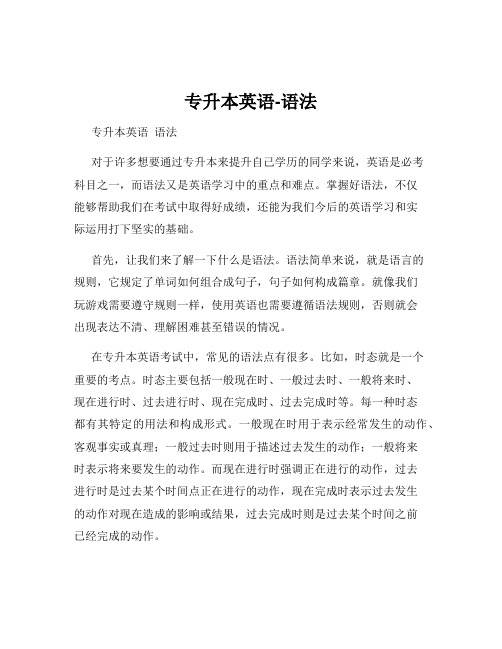
专升本英语-语法专升本英语语法对于许多想要通过专升本来提升自己学历的同学来说,英语是必考科目之一,而语法又是英语学习中的重点和难点。
掌握好语法,不仅能够帮助我们在考试中取得好成绩,还能为我们今后的英语学习和实际运用打下坚实的基础。
首先,让我们来了解一下什么是语法。
语法简单来说,就是语言的规则,它规定了单词如何组合成句子,句子如何构成篇章。
就像我们玩游戏需要遵守规则一样,使用英语也需要遵循语法规则,否则就会出现表达不清、理解困难甚至错误的情况。
在专升本英语考试中,常见的语法点有很多。
比如,时态就是一个重要的考点。
时态主要包括一般现在时、一般过去时、一般将来时、现在进行时、过去进行时、现在完成时、过去完成时等。
每一种时态都有其特定的用法和构成形式。
一般现在时用于表示经常发生的动作、客观事实或真理;一般过去时则用于描述过去发生的动作;一般将来时表示将来要发生的动作。
而现在进行时强调正在进行的动作,过去进行时是过去某个时间点正在进行的动作,现在完成时表示过去发生的动作对现在造成的影响或结果,过去完成时则是过去某个时间之前已经完成的动作。
除了时态,语态也是常考的内容。
语态分为主动语态和被动语态。
主动语态表示主语是动作的执行者,被动语态则表示主语是动作的承受者。
在理解和运用语态时,我们需要注意不同时态下被动语态的构成形式。
另外,名词、代词、形容词和副词等词类的用法也是语法学习的重要部分。
名词有可数与不可数之分,代词有人称代词、物主代词、指示代词等不同类型,形容词和副词在比较级和最高级的使用上也有特定的规则。
再来说说句子的类型。
句子可以分为简单句、复合句和复杂句。
简单句由一个主语和一个谓语构成;复合句则由一个主句和一个或多个从句组成,常见的从句有宾语从句、定语从句和状语从句等;复杂句则是包含多个从句的句子。
理解和掌握不同类型句子的结构和用法,对于我们正确理解和表达英语非常重要。
那么,如何才能学好专升本英语语法呢?第一,要注重基础知识的积累。
专升本考试英语语法总结
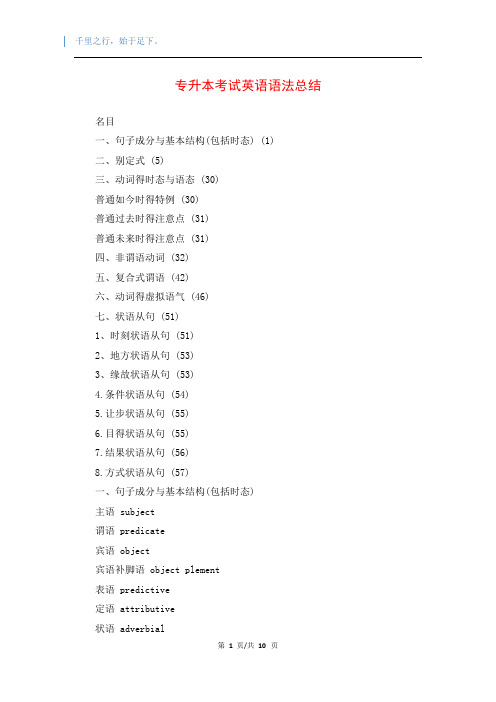
专升本考试英语语法总结名目一、句子成分与基本结构(包括时态) (1)二、别定式 (5)三、动词得时态与语态 (30)普通如今时得特例 (30)普通过去时得注意点 (31)普通未来时得注意点 (31)四、非谓语动词 (32)五、复合式谓语 (42)六、动词得虚拟语气 (46)七、状语从句 (51)1、时刻状语从句 (51)2、地方状语从句 (53)3、缘故状语从句 (53)4.条件状语从句 (54)5.让步状语从句 (55)6.目得状语从句 (55)7.结果状语从句 (56)8.方式状语从句 (57)一、句子成分与基本结构(包括时态)主语 subject谓语 predicate宾语 object宾语补脚语 object plement表语 predictive定语 attributive状语 adverbialWARMUP:1)The teacher in the classroom、 2)Sang many songs and danced happily、 3)She attracts、4)Many people living in the country、 5)All the books on the desk over there、以上这些形式都别能构成英语句子。
英语句子(sentence)=主语+谓语(核心:主动词)I.八大成分得概念与构成1.主语(名词代词形):句子得主体,算是谓语陈述,讲明得对象。
If you want the rainbow you have to put up with the rain、别记忆风雨,如何见彩虹。
The secret of success is to start from scratch and keep on scratching、成功得秘诀在于从磨练开始,并要坚持别断磨练。
充当主语得形式:1)名词2)代词3)名词短语4)名词从句5)数词6)别定式7)ing形式8)介词短语(少见) 形式主语(名词从句,别定式,动名词)(见第六说主语与宾语)2.谓语:表示主语得行为或举行得活动。
专升本英语语法时态难点解析

专升本英语语法时态难点解析在专升本英语考试中,语法时态一直是众多考生面临的难点之一。
掌握好英语的时态,对于准确理解和表达英语句子的含义至关重要。
本文将对专升本英语语法时态中的一些难点进行详细解析,帮助大家更好地掌握这一重要的语法知识。
一、一般现在时一般现在时表示经常发生的动作、习惯性的行为、客观真理、科学事实以及现阶段的状态。
这个时态看似简单,但在实际运用中,有一些容易出错的地方。
比如,当主语是第三人称单数时,动词要进行相应的变化。
很多同学会在这一点上疏忽,忘记在动词后面加“s”或“es”。
例如,“He likes playing football” 而不是“He like playing football” 另外,要注意一般现在时在时间状语从句和条件状语从句中的使用。
例如,“If it rains tomorrow, we won't go for a picnic” 这里虽然说的是明天的情况,但从句依然用一般现在时表示将来。
二、一般过去时一般过去时用于表示过去发生的动作或存在的状态。
在使用这个时态时,要注意动词的过去式的正确形式。
有些动词的过去式是规则变化,直接在词尾加“ed”,而有些则是不规则变化,需要特别记忆。
例如,“go”的过去式是“went”,“see”的过去式是“saw”。
同时,还要注意在复合句中,当主句和从句的动作都发生在过去时,时态的呼应问题。
如果两个动作同时发生,都用一般过去时;如果一个动作先发生,另一个动作后发生,先发生的动作用过去完成时,后发生的动作用一般过去时。
三、现在进行时现在进行时表示正在进行的动作。
其构成是“be +动词的现在分词”。
这里容易出错的是动词现在分词的构成,尤其是一些以重读闭音节结尾且末尾只有一个辅音字母的动词,要双写这个辅音字母再加“ing”,如“run running”“swim swimming”。
另外,要注意现在进行时与一般现在时的区别。
专升本英语语法与词汇知识点总结

专升本英语语法与词汇知识点总结英语在专升本考试中占据着重要的地位,而语法和词汇则是英语学习的基石。
掌握好语法和词汇,对于提升英语成绩,顺利通过专升本考试至关重要。
以下是为大家总结的专升本英语语法与词汇的重要知识点。
一、语法知识点1、时态时态是英语语法中的重点,包括一般现在时、一般过去时、一般将来时、现在进行时、过去进行时、现在完成时、过去完成时、过去将来时等。
一般现在时表示经常发生的动作或存在的状态,如:I go to school every day(我每天上学。
)一般过去时表示过去发生的动作或存在的状态,如:He played football yesterday(他昨天踢足球了。
)一般将来时表示将来要发生的动作或存在的状态,如:I will go to Beijing next week(我下周要去北京。
)现在进行时表示正在进行的动作,如:They are watching TV now (他们现在正在看电视。
)过去进行时表示过去某个时刻正在进行的动作,如:I was reading a book at eight last night(昨晚八点我正在读书。
)现在完成时表示过去发生的动作对现在造成的影响或结果,如:I have finished my homework(我已经完成了作业。
)过去完成时表示过去某个时间之前已经完成的动作,如:By the end of last year, I had learned 3000 words(到去年年底,我已经学了 3000 个单词。
)2、语态语态分为主动语态和被动语态。
主动语态表示主语是动作的执行者,被动语态表示主语是动作的承受者。
被动语态的构成是“be +过去分词”,如:The book is written by him (这本书是他写的。
)3、非谓语动词非谓语动词包括动词不定式、动名词和分词(现在分词和过去分词)。
动词不定式可以作主语、宾语、定语、状语等,如:To learn English well is not easy(学好英语不容易。
专升本语法知识点归纳整理

专升本语法知识点归纳整理专升本考试中的语法知识点是英语基础能力的重要组成部分,掌握好这些知识点对于提高考试成绩至关重要。
以下是对专升本语法知识点的归纳整理:开头:专升本考试的英语部分,语法是基础中的基础。
无论是阅读理解、完形填空还是写作,语法知识的正确运用都显得尤为重要。
以下是对专升本英语语法知识点的详细归纳。
名词:- 名词的单复数形式- 不可数名词- 名词的所有格形式动词:- 时态:一般现在时、一般过去时、一般将来时、现在完成时等- 语态:主动语态与被动语态- 非谓语动词:动名词、不定式、分词形容词和副词:- 形容词和副词的比较级和最高级- 形容词和副词的用法- 形容词和副词的比较结构代词:- 人称代词、物主代词、反身代词- 指示代词、疑问代词、不定代词冠词:- 不定冠词和定冠词的使用- 冠词的省略介词:- 介词的用法- 介词短语的构成连词:- 并列连词和从属连词- 连词在句子中的作用数词:- 基数词和序数词- 数词在句子中的使用句子结构:- 简单句、并列句、复合句- 主语、谓语、宾语、定语、状语、补语非谓语动词的用法:- 动名词作主语、宾语等- 不定式作目的状语、结果状语等- 分词作定语、状语等时态的一致性:- 时态的一致性原则- 不同时态的转换被动语态的构成:- 被动语态的构成方法- 被动语态的使用场合倒装句和强调句:- 倒装句的构成和用法- 强调句的构成和用法结尾:通过上述对专升本英语语法知识点的归纳整理,考生们可以更有针对性地复习和准备考试。
语法是英语学习的基石,只有扎实掌握语法知识,才能在专升本考试中取得优异的成绩。
希望每位考生都能够通过努力,实现自己的学业目标。
结束语:最后,祝愿所有考生在专升本考试中取得理想的成绩,为自己的未来铺设坚实的基础。
专升本语法知识汇总
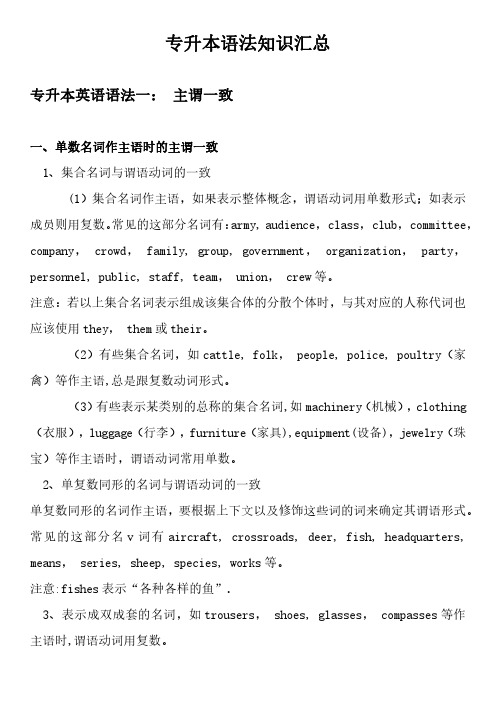
专升本语法知识汇总专升本英语语法一:主谓一致一、单数名词作主语时的主谓一致1、集合名词与谓语动词的一致(1)集合名词作主语,如果表示整体概念,谓语动词用单数形式;如表示成员则用复数。
常见的这部分名词有:army,audience,class,club,committee,company,crowd,family,group,government,organization,party,personnel,public,staff,team,union,crew等。
注意:若以上集合名词表示组成该集合体的分散个体时,与其对应的人称代词也应该使用they,them或their。
(2)有些集合名词,如cattle,folk,people,police,poultry(家禽)等作主语,总是跟复数动词形式。
(3)有些表示某类别的总称的集合名词,如machinery(机械),clothing (衣服),luggage(行李),furniture(家具),equipment(设备),jewelry(珠宝)等作主语时,谓语动词常用单数。
2、单复数同形的名词与谓语动词的一致单复数同形的名词作主语,要根据上下文以及修饰这些词的词来确定其谓语形式。
常见的这部分名v词有aircraft,crossroads,deer,fish,headquarters, means,series,sheep,species,works等。
注意:fishes表示“各种各样的鱼”.3、表示成双成套的名词,如trousers,shoes,glasses,compasses等作主语时,谓语动词用复数。
二、复数名词作主语时的主谓一致1、以“s”结尾的书刊名、国名、组织名、游戏名、运动名作主语时,谓语动词通常用单数形式.2、表示群岛、瀑布、山脉等以“s”结尾的专有名词作主语时,谓语动词往往用复数。
3、以“ies"结尾的名词指一门学科时,常用单数谓语动词形式。
专升本英语从句语法知识点精讲
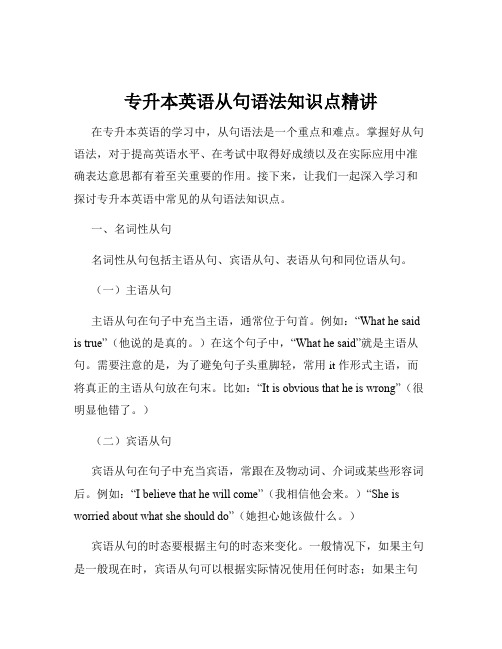
专升本英语从句语法知识点精讲在专升本英语的学习中,从句语法是一个重点和难点。
掌握好从句语法,对于提高英语水平、在考试中取得好成绩以及在实际应用中准确表达意思都有着至关重要的作用。
接下来,让我们一起深入学习和探讨专升本英语中常见的从句语法知识点。
一、名词性从句名词性从句包括主语从句、宾语从句、表语从句和同位语从句。
(一)主语从句主语从句在句子中充当主语,通常位于句首。
例如:“What he said is true”(他说的是真的。
)在这个句子中,“What he said”就是主语从句。
需要注意的是,为了避免句子头重脚轻,常用 it 作形式主语,而将真正的主语从句放在句末。
比如:“It is obvious that he is wrong”(很明显他错了。
)(二)宾语从句宾语从句在句子中充当宾语,常跟在及物动词、介词或某些形容词后。
例如:“I believe that he will come”(我相信他会来。
)“She is worried about what she should do”(她担心她该做什么。
)宾语从句的时态要根据主句的时态来变化。
一般情况下,如果主句是一般现在时,宾语从句可以根据实际情况使用任何时态;如果主句是一般过去时,宾语从句则要用相应的过去时态。
但如果宾语从句表示的是客观真理、自然现象等,无论主句是什么时态,从句都要用一般现在时。
(三)表语从句表语从句在句子中充当表语,位于系动词之后。
例如:“The problem is whether we can finish the work on time”(问题是我们能否按时完成工作。
)(四)同位语从句同位语从句用于解释说明前面的名词,通常与先行词在内容上等同。
常见的先行词有 idea, news, fact, belief 等。
例如:“The news that he won the game is exciting”(他赢得比赛的消息令人兴奋。
(word完整版)专升本英语语法

动词主要时态一般现在时 (am, is, are, do, does)1、表示现在经常或反复发生的动作或存在的状态,常和often, always, usually, sometimes, everyday 等时间状语连用;2、表示主语的特征、性格、能力等;3、表示客观事实或普遍真理;4、表示安排或计划好的将来要发生的动作;The plane takes off at 10 am。
5、在时间或条件状语中,表示将来的动作;When you see her just tell her that I am all right。
6、在某些文学作品的情节描写中,代替过去时,表示或用于引述书刊材料;The author says that the soldiers fight for freedom not for money。
一般过去时 (was, were, did)用于表示过去某时发生的动作或状态,常和表示过去的时间状语连用,如yesterday,last week,three years ago, in 1987, at the time , in July。
一般将来时主要用于表示将来发生的动作或情况在时间或条件状语中 ,一般不用将来时,而是用现在时代替将来时 。
I’ll let you know the result when I finish everything。
1、shall, will + 动词原型构成一般将来时;2、am (is , are) going to + 动词原型,表示近期打算去做的事情或可能要发生的事情;3、am (is , are) about to + 动词原型,表示即将发生的动作;4、am (is , are) to + 动词原型,表示必须或计划要进行的动作 You are to be here by 4 pm for collecting the shipment you ordered.过去将来时用于表示过去某一时间内,将要发生的动作或存在的状态was (were) going to +动词原型was (were) about to +动词原型was (were) to + 动词原型 表示过去某时间内计划、打算或一定要进行的动作现在进行时go, come , stay , leave , start 的现在进行时形式可以表示将来即将发生的动作He is coming to see you tomorrow。
- 1、下载文档前请自行甄别文档内容的完整性,平台不提供额外的编辑、内容补充、找答案等附加服务。
- 2、"仅部分预览"的文档,不可在线预览部分如存在完整性等问题,可反馈申请退款(可完整预览的文档不适用该条件!)。
- 3、如文档侵犯您的权益,请联系客服反馈,我们会尽快为您处理(人工客服工作时间:9:00-18:30)。
注:现在完成时不能和明确指出时间的状语 (如:yesterday, last year, in 1976, two days ago, just now, when I came in 等) 连用,但可以和不明确指出时间的状语 (如:already, just, yet, sometimes, always, often, before, lately, recently, once,
试比较:I saw him this morning. 今天上午遇见了他. (说话时是下午) 10)It has been hot this summer. 今年夏天一直很热. (说话时仍是夏天)
(二)现在完成进行时 (1)构成
have/has been+现在分词 (2)用法
1.现在完成进行时动词表示从过去开始一直 持续到现在的动作,这个动作 可能刚刚结束,也可能还要继续下去,常与 for two hours, since 1986, all this morning, these few days等表示一段时间的状语连用.例如: 1)I have been reading all the morning. 我一上午都在读书.
简 Yes, you have. No, you haven’t. 单 Yes, I have. No, I haven’t. 回 Yes, he has. No, he hasn’t. 答 Yes, we have. No, we haven’t.
Yes, they have. No, they haven’t.
(试与She has lived there since 1970 比较) 4)I have been writing letters. 我一直在写信.
(试与I have written two letters 比较.)
5)Where have you been? We have been looking for you everywhere. 你去哪儿了?我们一直在找你. (试与 I was looking for you everywhere 比较. )
2)I have opened the window. (I opened the window and the window is open now.) 我已把窗户打开.
3)I have bought an umbrella. (I bought an umbrella and I have it now.) 我买了一把伞.
6)I have just been watching TV. 我一直都在看电视.
2.现在完成进行时动词表示一直到说话时为止的一段时间内一再重复的动作. 例如:
1)I have been telephoning to you several times in two days. 两天内我给你打过几次电话.
*His father has died for five months. 可以说:He has been in Beijing for seven years.
He has been away from Beijing for two years.
He has been in the army for three years. His father has been dead for five months. 或: It is seven years since he came to Beijing.
ห้องสมุดไป่ตู้
一般过去时
1)I have seen him. 我已见过他了.
2)He has had lunch. 他吃过午饭了.
3)I have written to him. 我已给他写过信 了.
4)I have been ill for a week. 我已病了一 周了. (现在还在生病 .)
5)I have never met him since last month. 自从上月到现在我从未见过他. (现在还 没见面.)
你今天早晨干什么了? (看来你累了.) 2)You have been reading newspapers. (Newspapers are lying about in your room.)
你一直在读报吧. (你的房间里到处摊着报纸.) 3)You have been teaching. (Your pocket is covered with chalk dust.)
It is two years since he left Beijing.
It is three years since he joined the Army.
It is five months since his father died.
现在完成时与一般过去时在意义上的区别举例如下:
现在完成时
式 They have not (haven’t) studied.
疑 Have I studied? Have you studied?
问 Has he studied? Have we studied?
式 Have they studied?
否 Have I not studied? (Haven’t I studied?) 定 Have you not studied? ( Haven’t you studied?) 疑 Has he not studied? (Hasn’t he studied?) 问 Have we not studied? (Haven’t we studied?) 式 Have they not studied? (Haven’t they studied?)
4)The concert has started. (The concert started and is now going on.) 音乐会已经开始.
5)I have had breakfast. (I had breakfast and I am not hungry now.)我已吃过早饭.
不能延续的,故不能与for …, since …等开头的表示一段时间的状语连用. 如不能说:*He has come to Beijing for seven years.
*He has left Beijing for two years.
*He has joined the Army for three years.
1)I saw him yesterday.昨天看到过他.
2)He had lunch at 12:00.他十二点吃过 午饭.
3)I wrote to him last night.我昨晚给他写 过信.
4)I was ill for a week. 我病了一周.(过去 病了,现在好了.)
5)I didn’t see him for ages.我那时有好 久没见到他.
2)They have been drinking black tea all the afternoon. 他们一下午都在喝红茶.
3.现在完成进行时动词表示一直到说话时为止的一段时间内,大部分时间都在持 续进行的动作(不一定延续到说话的时候),往往暗示这个动作对现状的影响.
例如: 1)What have you been doing this morning? (You look tried.)
If you put your hear into it, you will find it easy.
第一讲. 时 态
• 英语主要靠动词本身形式的变化来表示动作的时间,副词的作用不大, • 语助词几乎没有。 • 英语的句子,除少数特殊情况外,只要都离不开时态,都以一定的 • 时态出现。换言之,只要是句子,就有时态问题。理由很简单:一个 • 句子必须有主语和谓语动词(主要动词),而后者总是用于某一时态。 • 学英语,时态是逃避不了的,但它并不是一个消极的因素。恰好 • 相反,它有很强的表达力,能使句子的意思明确,能显示细微的差别, • 有时还能使句子生动有趣。 • 一般英语有12种时态,即现在,过去,将来三大类,每一类中又分为 • 一般,进行,完成,完成进行4种。 •
twice, ever, never, so far, up to now, up till now, from then on, these days /months/years等) 连用; 也可以和表示包括现在在内的时间状语 (如: this
morning, today, this week, this year等) 连用.例如: 1)she has already come.她已经来了. 2)I haven’t read it yet.我还没读过这个. 3)I have met him before. 我从前曾见过他. 4)Ma Hong has always been a good student. 马红一直是个好学生. 5)I have often seen him in the street.我经常在街上见到他. 6)They have never been to Yan’an.他们从未去过延安. 7)Have you ever been to the Daqing Oilfield? 你曾去过大庆油田吗? 8)I haven’t seen him lately. 我近来没看到他. 9)I have seen him this morning. 我上午看见他了。 (说话时在上午)
(试与 I have read three books this morning 比较. ) 2)He has been staying here for two hours. 他在这儿待了两个小时了.
(试与He was here for two hours 比较.) 3)She has been living there since 1970. 她从一九七O年以来就住在这里.
